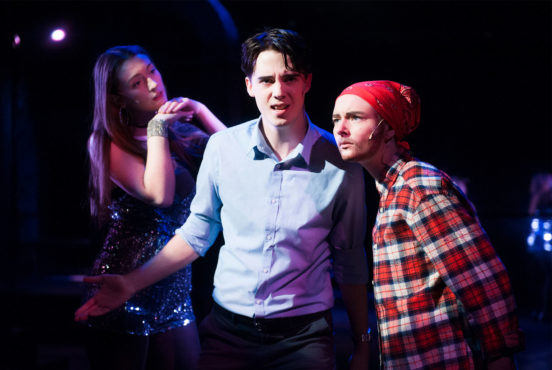Lights, music, and acting make for thrilling experience

Rachel Myers, Brendan Elwell, and Emma Grabinsky in the Phoenix’s latest production, Comedy of Errors. Photo by David Lowes via the Phoenix Theatre
It’s doubtful that any audience member has gotten whiplash in a theatre, but the audience at the opening night of The Comedy of Errors must have come close. The stage is active from the moment the audience finds their seats, with a troupe of musicians playing gentle medieval tunes right up until the darkening of the house. It’s quiet — lulling even — but that only lasts until the curtain comes up and the cast rocket-launches themselves into the first musical number of the show.
The Comedy of Errors is Shakespeare at his most . . . most what? Most everything — most ridiculous, most crude, most farcical. It’s a convoluted story of mistaken identity with not one, but two sets of twins who have inexplicably grown up divided from their other half and paired up with the other sets’ twin. It doesn’t matter if the premise is confusing because the entire play is confusing, but also you shouldn’t really care because the rest of it is just too damn fun in the same kind of way that you paid money to see Jupiter Ascending in theatres multiple times.
This iteration of Comedy is potentially the most conceptually ambitious adaptation of any of Shakespeare’s work recently performed in Victoria. Any Shakespeare play is timeless — it’s why creators return to it time and time again — but it takes true talent and inspiration to make it bloom in the present. Director Jeffrey Renn’s pop musical vision is cohesive, adoringly obnoxious, and, above all, surprising. Whatever he decides to pursue next, consider it a sure bet that I’ll be in the audience.
Where the show succeeds brilliantly in concept, it struggles in some of its technical parts, which should be expected in a production that literally involves hundreds of light and sound cues (plus some incredibly cool special effects). The lighting design by Michael Whitfield is both eclectic and erratic, ranging from a comfortable scenic glow to an unfortunate over-reliance on glaring overhead spotlights. If you are sensitive to flashing lights or bright reflections, please do take that into consideration when attending the show.
The selection of music is another bright spot, with a selection of tunes from Queen, Justin Timberlake, Beyoncé, Imagine Dragons, and more, lyrics tweaked to fit into the context of the story. When moving between dialogue and song, it was disorientating to have actors voices switch between speaking volume and enhanced by a microphone because the direction of sound would change abruptly. This normally wouldn’t be a problem, except the cast and crew regularly run out into the aisles of the theatre and half the audience turns away to look for someone who isn’t actually there when the audio speakers kick in.
The best songs were often the ones performed by the ensemble, because it offered opportunities for the exceptional choreography to shine. Whatever is happening in choreographer Christina Penhale’s brain, it’s clearly a great place to be. The choreography is supplemented by ingenious blocking and physical comedy, such as a scene where two characters are walking away from a door — against expectations, the door physically moves off stage and the two actors walk in place.
Whatever the technical complexity, Comedy makes up for any faults in aces. Its strength is — unsurprisingly — the comedy, which was brought to a riotous level by a exceptional ensemble cast who all are conscious of the absurdity of the material and have given themselves over to it entirely.
Brendan Elwell is delightful as one Antipholus twin, embodying the Canadian fish in the big American pond, and his sense of physical comedic timing shines throughout, especially during an amusing Mission Impossible sequence. Douglas Peerless plays the American Antipholus, a character as close to the straight man as we’re going to get, and his consistency in manner and presence offered many of his fellow actors opportunities to play off him — a trait that is unendingly important but egregiously undervalued.
The show stealers are by and far the Dromio twins, played with exceptional personality and tenacity by Chantal Gallant and Emma Grabinksy. One standout scene features the two characters yelling at each other through a closed door, unbeknownst that the other is their twin. If Shakespeare had one true failing in his illustrious career, it’s that he did not write a sequel to Comedy featuring the Dromio twins so that five hundred years later these two phenomenal actors could headline a show themselves.
There are too many cast members to praise them all, but the truth of the matter is that every single one of them is superb and this would be half the show that it is without their energy. All in all, The Comedy of Errors is well-worth an evening out with friends but it’s best experienced without expectations or reservations about the material. Leave your training wheels at home, there’s no room for them here.
The Phoenix Theatre is showing The Comedy of Errors from March 15 to 24. There are 8 p.m. shows Monday through Saturday and a 2 p.m. matinee on Saturdays. Adult and senior tickets are $26 and $21 respectively, though UVic alumni can purchase $16 tickets at matinee shows. Student tickets are $16 every night.







